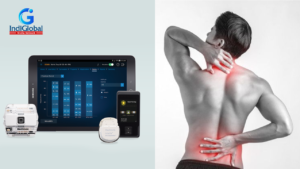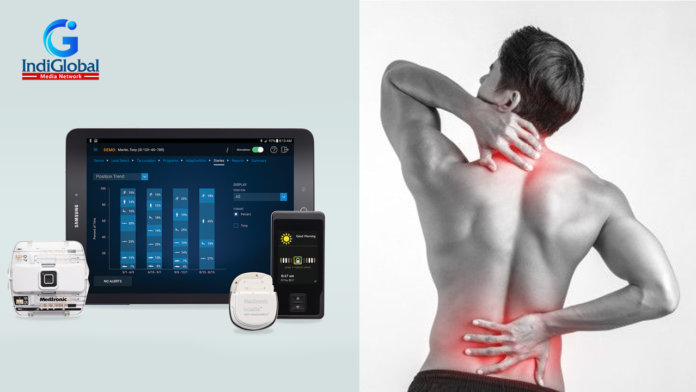IndiGlobal Media Bureau
Chronic pain destabilizing people from exercise, work, sleep and even eating has been noted in 19 percent of the adult population in India. Epidemiological studies based on telephone surveys show that chronic pain led to four hours of work loss in 32 percent of the patients. They complained that they were no longer able to exercise, sleep, maintain relationships with friends and family and also maintain an independent lifestyle.
Pain management is evolving and use of technology to provide relief is being explored. Spinal Cord Stimulation platform is the smallest SCS device for management of chronic intractable plans. The first clinical procedure in India with India Medtronic, Intellis SSC was carried out in Mumbai, Jaslok Hospital.
 Dr Paresh Doshi, director of neurosurgery at the Jaslok Hospital and Research Centre, Mumbai, successfully implanted the first Intellis device in a patient in India for the management of pain.
Dr Paresh Doshi, director of neurosurgery at the Jaslok Hospital and Research Centre, Mumbai, successfully implanted the first Intellis device in a patient in India for the management of pain.
The Intellis platform offers DTM SCS therapy, a unique differential target multiplexed spinal cord stimulation programming option to treat patients with chronic pain. DTM SCS therapy, which is proven only on the Medtronic Intellis platform, demonstrated statistically significant and superior back pain relief for patients compared to conventional SCS in a randomized controlled trial (RCT).
More than 19% of the Indian adult population suffers from chronic pain of some kind. Respondents of an epidemiological telephonic survey with chronic pain in India were no longer able to exercise, sleep, maintain relationships with friends and family, and maintain an independent lifestyle. About 32% of patients lost 4 hours of work.
“Chronic pain can affect people to the point that they can’t work, eat properly, take part in physical activity, or enjoy life. It can persist beyond the usual recovery period or occur along with a chronic health condition. While it can be challenging to manage chronic pain, an attempt is made to reduce the severity of symptoms that come along. Treatment modalities like spinal cord stimulation can significantly improve the quality of life by alleviating pain. The Intellis platform is a welcome option to help optimize treatment and improve the outcome in these patients. It may also improve patient-physician communication by tracking and sharing activities, therapy usage and by giving physicians an objective look at treatment progress.” said Dr. Doshi.
“Spinal cord stimulation can be an effective alternative or adjunct treatment to other therapies that have failed to manage pain on their own. The Intellis neurostimulator is the world’s smallest implantable spinal cord stimulator. At Medtronic we are constantly designing life-transforming innovations that put patients first,” said Rahul Arora, head of Neurosciences Therapies, Medtronic India.
In addition to offering DTM SCS therapy, the Intellis platform is a high-performance SCS device powered by proprietary Overdrive battery technology. It offers three times faster recharge than traditional battery choices and has minimal capacity fade at 9-years (less than 5%). It is optimized for a wide range of energy demands and provides effective long-term pain relief for patients. The neurostimulator features SureScan full-body MRI technology, allowing access to MRI anywhere in the body under certain conditions. The Intellis platform includes Adaptive Stim technology, which can automatically adjust stimulation to maintain therapy dose. Snapshot reporting, powered by the Intellis accelerometer and the smart clinician app, transforms the conversation from subjective to objective by monitoring and providing activity data. Physicians can review progress and make modifications to better suit their patients’ therapy needs.
SCS is one of many therapy options available to treat chronic pain. It involves implanting a neurostimulator under the patients’ skin which delivers mild electrical impulses to the spine to block pain signals from going to the brain. Neurostimulation has been proven to provide effective long-term pain relief and improve quality of life, in addition to being a treatment option for patients interested in trying a non-drug alternative.








